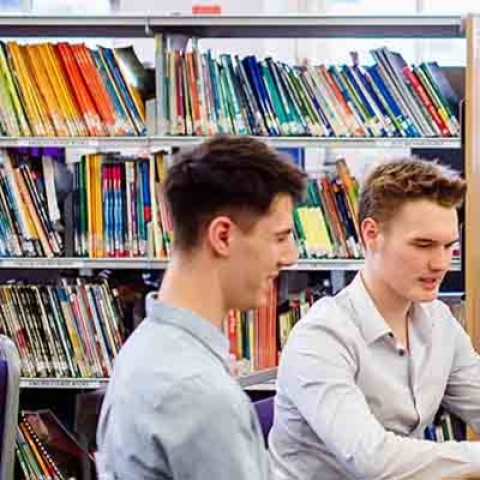

Are you or your child choosing making GCSE choices? If yes, then read our Choosing Your GCSEs detailed guide
One of the biggest decisions you have to make in school is choosing which GCSEs to study.
It’s an exciting time. But it can also be a worrying time. How can you make sure you make the best choices? And how will the GCSEs you decide on now affect your future study and career?
In this guide, we'll look at how you can make the best decision when it comes to choosing your GCSEs.
Making your GCSE choices
- Ask your teachers about the deadline for picking your subjects and set it in your calendar
- Write out the kinds of jobs, careers or kind of life you'd like to have
- Ask yourself what about them excites yourself and write it down
- If you know what you'd like to do, write out an ideal pathway of how you'd get here
- Find out which subjects are compulsory for your school
- Write down a list of compulsory classes and subjects you'd like to do based on the job, career or life you want to have
- If you're interested in vocational courses ask your teachers what's available and find out how you can combine them with your GCSE subjects
- Review your first choices, have you picked too little or too many? Which ones do you care about more
- Discuss your choices with your family, teachers or other people who you trust
- Ask your school and search online for local options evenings, careers fairs and college talks so you can learn from as many sources as you can
After each chat or event spend some time thinking over your ambitions and subject choices:
- Has new information made you reconsider your first plan?
- How so and for what reason?
- Put together a final list a week before the deadline and treat it as if you've made your choices.
- Come back to it in a couple of days. How did making the commitment make you feel? If you've had second thoughts chat about them with someone close to you.
- Make any final changes and make sure you submit before the deadline closes.
If you're a more creative type you could take subjects such as:
- Art and Design
- Design and Technology
- Music
- Drama
If you're interested in science then you could take any or a combination of:
- Biology
- Chemistry
- Physics
Choosing your GCSEs – detailed guide
You study your GCSEs over 2 years at Key Stage 4 in school years 10 and 11, with your final exams coming at the end of year 11.
They're an important part of your education. If you've got a plan, picking the right GCSEs can help you get to where you want to be so you can do the things you care about in your life.
But your GCSEs are not the be-all and end-all. Your choices now won't necessarily narrow your future options. Think of choosing your GCSEs as a chance to study more of what you're good at or what interests you.
When to choose your GCSEs
You'll likely choose your GCSEs towards the end of Year 8 or the start of Year 9 when you're 12, 13 or 14.
Your school will let you know when you have to choose your options and you'll get plenty of time to think it over.
How many GCSEs to choose
You can choose 5–12 GCSEs and your school will advise you on the number of GCSEs to take.
You generally need to take at least 5 GCSEs to go on to A levels and other forms of further education. Most colleges, universities and employers prefer people to take around 9 or 10 subjects.
Vocational courses
Some schools offer additional options in the form of vocational courses, such as BTECs, in areas like sport, science, media and business.
Vocational means it's more of a hands-on course where you gain practical skills and knowledge, either for a particular career or for higher education.
Your school will let you know if these are an option for you and how many you can choose alongside GCSEs.
Making your GCSE choices
When you make your choices, start by finding out which subjects you have to do (compulsory subjects) and what subject options are available to you.
Subjects you have to do
There are 3 compulsory GCSEs that everyone has to take:
- English
- Mathematics
- Science
There may also be extra compulsory subjects at your school, such as humanities or a language.
Choosing your options
Aside from your compulsory subjects, the other subjects you study are up to you.
Once you know what subjects you have to do and what options are available, think about the kind of job, career, or life you'd like to have.
If your school holds them, go along to offer options evenings, careers fairs, and college talks. Start looking at college, university, and career websites to get an idea of your future options and find out what qualifications you need. What GCSEs do you need to study certain subjects at college or sixth form?
Also, think about what subjects you're good at and what subjects you enjoy. These subjects are likely to make good choices, even if you're unsure of your future direction because it's more likely to lead you to a career that interests you and uses your strengths.
Consider how you'll learn and be assessed too. GCSEs aren't just exams – there are coursework and practical assessments too. You should chat with your teachers to find out how exactly you'll be marked in the subjects you might choose.
Or if you want to work with people from around the world taking a modern foreign language can be super helpful. Each school is different but you could take subjects like:
- French
- German
- Spanish
- Mandarin
Don't pick a subject because your friend is doing it – you might not even be in the same class.
Getting help
It’s important to make your own decisions, but it’s also wise to get opinions from an older brother or sister, parent or carer, or teacher – someone who knows you and can give you good advice.
If you want to work in a particular industry like engineering or childcare have a look at university or career websites to find additional information, then you can focus on subjects that you might need.
Finding that extra info will help you figure out which subjects you'll need to go on to college, university or another vocational course.
Ways your parents can help
Parents and carers can be a great help when it comes to choosing your GCSEs.
They can offer you advice and support so you can come to the best decision for you. Your GCSEs are the first of some important steps you'll take over the next few years. Having your parents on board can make things a lot easier. So it's best to sit down and talk with them about what you want and the kind of help you'd like.
Your parents or carers can help by:
- Listening to your thoughts and ideas about the future and finding out more information about how you can get there.
- Offering their advice and opinion on your options but remembering that they're there as a guide, not to make your choices for you.
- Reading all the literature and information available from your school, other websites, colleges and universities together.
- Helping you write your pros and cons lists if you're struggling to decide between a few different subjects
- Taking you to school options evenings, careers fairs and college open days so you can hear from knowledgeable people
- Encouraging you to go to university events – many universities run free outreach events so you can see if it's right for you
If you're not sure what to do
It’s OK if you’re unsure about what GCSEs choose.
In this case, it’s a good idea to pick a broad range of subjects – including some you really enjoy – to keep your options open.
If you're still not sure, go with your gut feeling. By the end of your GCSEs, you'll probably have a much better idea of what you enjoy and what your career path could look like.
GCSE grades
Once you've completed your GCSE exams you'll be given a final grade from 1 to 9, with 9 being the top grade.
You might be more familiar with the past grading system of A to U. Use the table below to see how the past grades compare to the new ones.
| Old grades | New grades |
|---|---|
| 9 | |
| A* | 8 |
| A | 7 |
| B | 6 |
| C | 5 (strong pass) |
| D | 4 (standard pass) |
| E | 3 |
| F | 2 |
| G | 1 |
| U | U |
Post-16 talks and events for schools and colleges
Explore presentations, workshops, events, webinars and activities for students to learn more about higher education and going to uni.

Subject events for schools and colleges
Get an insight into studying subjects at university with our subject-specific events and Taster Days.


